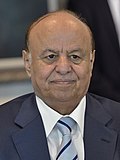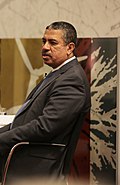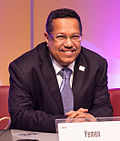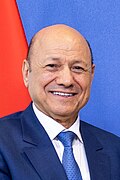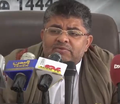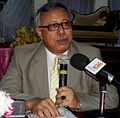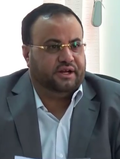| Portrait | Prime Minister
(Birth–Death) | Term of office | Political party | President(s)
(Term) |
|---|
| Took office | Left office | Time in office |
|---|
|  | Abdullah al-Sallal
(1917–1994) | 28 September 1962 | 26 April 1963 | 210 days | Military | | Abdullah al-Sallal

(1962–1967) |
|---|
| 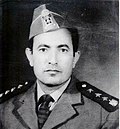 | Abdul Latif Dayfallah
(1930–2019) | 26 April 1963 | 5 October 1963 | 162 days | Military |
|---|
|  | Abdul Rahman al-Eryani
(1910–1998) | 5 October 1963 | 10 February 1964 | 128 days | Independent |
|---|
|  | Hassan al-Amri
(1920–1989) | 10 February 1964 | 29 April 1964 | 79 days | Military |
|---|
|  | Hamoud Al-Jaifi
(1918–1985) | 29 April 1964 | 6 January 1965 | 252 days | Independent |
|---|
|  | Hassan al-Amri
(1920–1989) | 6 January 1965 | 20 April 1965 | 104 days | Military |
|---|
| 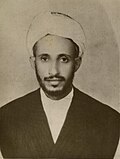 | Ahmad Muhammad Numan
(1909–1996) | 20 April 1965 | 6 July 1965 | 77 days | Independent |
|---|
|  | Abdullah al-Sallal
(1917–1994) | 6 July 1965 | 21 July 1965 | 15 days | Military |
|---|
|  | Hassan al-Amri
(1920–1989) | 21 July 1965 | 18 September 1966 | 1 year, 59 days | Military |
|---|
|  | Abdullah al-Sallal
(1917–1994) | 18 September 1966 | 5 November 1967
( deposed.) | 1 year, 48 days | Military |
|---|
|  | Mohsin Ahmad al-Aini
(1932–2021) | 5 November 1967 | 21 December 1967 | 46 days | Independent | | Abdul Rahman al-Eryani

(1967–1974) |
|---|
|  | Hassan al-Amri
(1920–1989) | 21 December 1967 | 9 July 1969 | 1 year, 200 days | Military |
|---|
|  | Abdul Salam Sabrah
(1912–2012) | 9 July 1969 | 29 July 1969 | 20 days | Independent |
|---|
|  | Mohsin Ahmad al-Aini
(1932–2021) | 29 July 1969 | 2 September 1969 | 35 days | Independent |
|---|
|  | Abdullah Kurshumi
(1932–2007) | 2 September 1969 | 5 February 1970 | 156 days | Independent |
|---|
|  | Mohsin Ahmad al-Aini
(1932–2021) | 5 February 1970 | 26 February 1971 | 1 year, 21 days | Independent |
|---|
|  | Abdul Salam Sabrah
(1912–2012) | 26 February 1971 | 3 May 1971 | 66 days | Independent |
|---|
|  | Ahmad Muhammad Numan
(1909–1996) | 3 May 1971 | 24 August 1971 | 113 days | Independent |
|---|
|  | Hassan al-Amri
(1920–1989) | 24 August 1971 | 5 September 1971 | 12 days | Military |
|---|
|  | Abdul Salam Sabrah
(1912–2012) | 5 September 1971 | 18 September 1971 | 13 days | Independent |
|---|
|  | Mohsin Ahmad al-Aini
(1932–2021) | 18 September 1971 | 30 December 1972 | 1 year, 103 days | Independent |
|---|
|  | Abdullah al-Hagri
(1911–1977) | 30 December 1972 | 10 February 1974 | 1 year, 42 days | Independent |
|---|
|  | Hassan Muhammad Makki
(1933–2016) | 10 February 1974 | 22 June 1974 [a] | 132 days | Independent |
|---|
|  | Mohsin Ahmad al-Aini
(1932–2021) | 22 June 1974 | 16 January 1975 | 208 days | Independent | | Ibrahim al-Hamdi

(1974–1977) |
|---|
|  | Abdul Latif Dayfallah
(1930–2019) | 16 January 1975 | 25 January 1975 | 9 days | Military |
|---|
|  | Abdul Aziz Abdul Ghani
(1939–2011) | 25 January 1975 | 15 October 1980 | 5 years, 264 days | Independent |
|---|
| Ahmad al-Ghashmi

(1977–1978) |
|---|
| Abdul Karim Abdullah al-Arashi

(1978) |
|---|
| Ali Abdullah Saleh

(1978–1990) |
|---|
|  | Abdul-Karim Al-Iryani
(1934–2015) | 15 October 1980 | 13 November 1983 | 3 years, 29 days | Independent
(until 24 August 1982.) |
|---|
| General People's Congress |
|---|
|  | Abdul Aziz Abdul Ghani
(1939–2011) | 13 November 1983 | 22 May 1990 [7] | 6 years, 190 days | General People's Congress |
|---|































